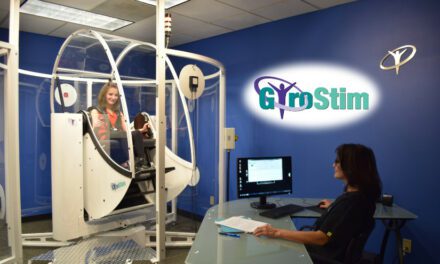A new study from the University of South Australia is exploring the potential of a unique sport – RaceRunning – to help children with cerebral palsy improve their movement, social connections, and mental health.
Conducted in partnership with the Women’s and Children’s Health Network (WCHN) and funded by the Channel 7 Children’s Research Foundation, the study will engage 10-15 children and teens (aged 6-17 years old) with cerebral palsy in a 12-week RaceRunning study during which their physical, social, and mental health will be monitored.
RaceRunning – or Frame Running – is a sport that uses a three-wheeled “bike” frame to support the body weight of a person who has a gait impairment, allowing them to propel themselves forward and move at quick pace.
Improve Quality of Life
UniSA researchers Associate Professor Kade Davison and Lauren McDougall say that findings from the new trial could significantly improve the quality of life for children with cerebral palsy.
“Children with cerebral palsy can have difficulty walking and running which leaves them often unable to participate in the same sports or activities as many of their typically developing peers, including school PE and general play. This not only affects their ability to get enough physical exercise but also their ability to form solid friendships. As a result, children with cerebral palsy can suffer increased anxiety and depression.
“RaceRunning gives kids an opportunity to participate in an activity that allows them to experience the rush of being able to run – something that many kids with cerebral palsy have never experienced – while also letting them play and socialize with others in the same situation.”
— Lauren McDougall
WCHN head of research, Paediatric Rehabilitation Department, Associate Professor Ray Russo, says it’s wonderful to see the University of South Australia conducting research in this area.
“The families of patients who do RaceRunning tell me it has helped their children with improvements in muscle strength, mobility and participation in sporting activities. However, there is little scientific research in this field, especially in the areas of social connections and mental health, so this research project is an exciting opportunity to assess the benefits of this growing sport.”
Working with Children
The study will work with children with a Gross Motor Function Classification Score (GMFCS) of III, IV or V. Each will be fitted for an appropriately sized RaceRunning frame and participate in at least one of two group sessions per week over the 12-week study.
Chief investigator, Assoc Prof Kade Davison says boosting physical and social opportunities among children and teens with cerebral palsy could have lifelong benefits.
“Physical activity is essential for optimal physical, emotional and psychosocial development of all children, yet for kids with cerebral palsy, the unpredictability of their movements can make physical movement difficult, affecting their self-esteem, confidence and independence.
“RaceRunning offers these kids the opportunity to with kids who have similar disabilities, empowering them to experience the freedom of greater mobility, and importantly, a sense of fun and comradery with their peers.”
— Kade Davison
[Source(s): University of South Australia, Newswise; image courtesy of University of South Australia]





